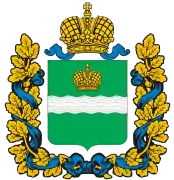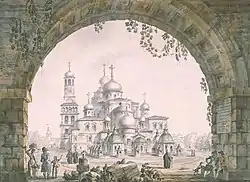Borovsk
Borovsk (Russian: Бо́ровск) is a town and the administrative center of Borovsky District of Kaluga Oblast, Russia, located on the Protva River just south from the oblast's border with Moscow Oblast. Population: 12,283 (2010 Census);[3] 11,917 (2002 Census);[8] 13,405 (1989 Census);[9] 12,000 (1969).
Borovsk
Боровск | |
|---|---|
Town[1] | |
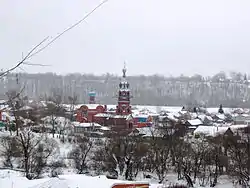 View of Borovsk | |
.png.webp) Flag _(1777).png.webp) Coat of arms | |
Location of Borovsk 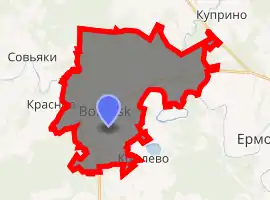
| |
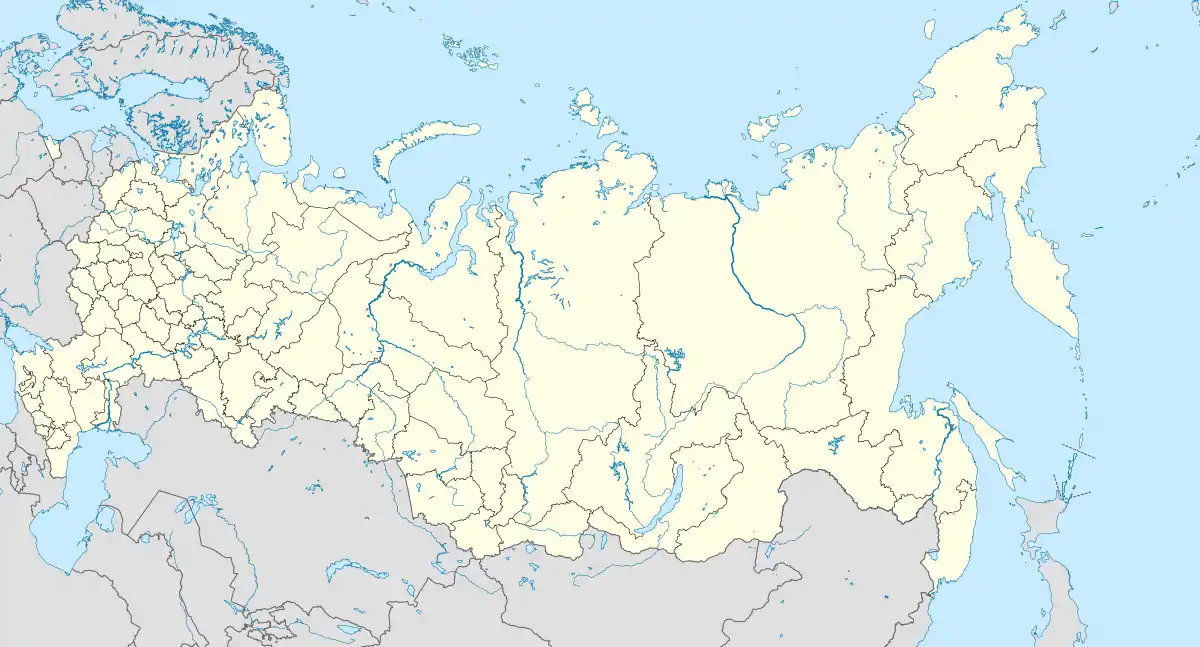 Borovsk Location of Borovsk 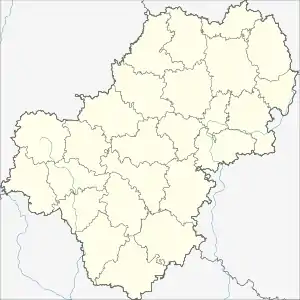 Borovsk Borovsk (Kaluga Oblast) | |
| Coordinates: 55°12′N 36°30′E | |
| Country | Russia |
| Federal subject | Kaluga Oblast[1] |
| Administrative district | Borovsky District[1] |
| Founded | 1356[2] |
| Government | |
| • Head | Mikhail Klimov (acting) |
| Elevation | 166 m (545 ft) |
| Population | |
| • Total | 12,283 |
| • Estimate (2018)[4] | 10,734 (−12.6%) |
| • Capital of | Borovsky District[1] |
| • Municipal district | Borovsky Municipal District[5] |
| • Urban settlement | Borovsk Urban Settlement[5] |
| • Capital of | Borovsky Municipal District[5], Borovsk Urban Settlement[5] |
| Time zone | UTC+3 (MSK |
| Postal code(s)[7] | 249010 |
| Dialing code(s) | +7 48438 |
| OKTMO ID | 29606101001 |
| Website | www |
History
It is known to have existed since 1356[2] as a part of the Principality of Ryazan. In the 14th century, it was owned by Vladimir the Bold, but passed to the Grand Duchy of Moscow when his granddaughter Maria of Borovsk married Vasily II.
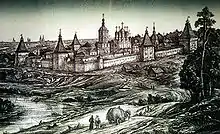
In 1444, the St. Paphnutius Monastery was founded near Borovsk. Its strong walls, towers, and a massive cathedral survive from the reign of Boris Godunov. Two famous Old Believers—archpriest Avvakum Petrovich and boyarynya Feodosiya Morozova—were incarcerated at this monastery in the second half of the 17th century. The town was liberated by the Red Army on January 4, 1942.

Administrative and municipal status
Within the framework of administrative divisions, Borovsk serves as the administrative center of Borovsky District, to which it is directly subordinated.[1] As a municipal division, the town of Borovsk is incorporated within Borovsky Municipal District as Borovsk Urban Settlement.[5]
Culture
Among the monuments of Borovsk are the oldest wooden church in the region (the 17th century) and a museum of Konstantin Tsiolkovsky, who lived and worked there as a teacher in 1880–1891. Borovsk has recently been known for painted façades of its down-town buildings, resulting from a work of one local painter.
Sights
- Pafnutyevo-Borovsky monastery, an ensemble of architectural monuments of the 16th-17th centuries.[10]
- Church of the Intercession of the Holy Virgin
- Apartment Museum Konstantin Tsiolkovsky
- Gallery of wall paintings created by self-taught artist Vladimir Ovchinnikov
- Monument to Konstantin Tsiolkovsky
- Chapel-monument to the alleged place of detention and the death of Boyar Morozova
References
Notes
- Государственный комитет Российской Федерации по статистике. Комитет Российской Федерации по стандартизации, метрологии и сертификации. №ОК 019-95 1 января 1997 г. «Общероссийский классификатор объектов административно-территориального деления. Код 29 206», в ред. изменения №278/2015 от 1 января 2016 г.. (State Statistics Committee of the Russian Federation. Committee of the Russian Federation on Standardization, Metrology, and Certification. #OK 019-95 January 1, 1997 Russian Classification of Objects of Administrative Division (OKATO). Code 29 206, as amended by the Amendment #278/2015 of January 1, 2016. ).
- Энциклопедия Города России. Moscow: Большая Российская Энциклопедия. 2003. p. 52. ISBN 5-7107-7399-9.
- Russian Federal State Statistics Service (2011). "Всероссийская перепись населения 2010 года. Том 1" [2010 All-Russian Population Census, vol. 1]. Всероссийская перепись населения 2010 года [2010 All-Russia Population Census] (in Russian). Federal State Statistics Service.
- "26. Численность постоянного населения Российской Федерации по муниципальным образованиям на 1 января 2018 года". Federal State Statistics Service. Retrieved January 23, 2019.
- Law #7-OZ
- "Об исчислении времени". Официальный интернет-портал правовой информации (in Russian). June 3, 2011. Retrieved January 19, 2019.
- Почта России. Информационно-вычислительный центр ОАСУ РПО. (Russian Post). Поиск объектов почтовой связи (Postal Objects Search) (in Russian)
- Russian Federal State Statistics Service (May 21, 2004). "Численность населения России, субъектов Российской Федерации в составе федеральных округов, районов, городских поселений, сельских населённых пунктов – районных центров и сельских населённых пунктов с населением 3 тысячи и более человек" [Population of Russia, Its Federal Districts, Federal Subjects, Districts, Urban Localities, Rural Localities—Administrative Centers, and Rural Localities with Population of Over 3,000] (XLS). Всероссийская перепись населения 2002 года [All-Russia Population Census of 2002] (in Russian).
- "Всесоюзная перепись населения 1989 г. Численность наличного населения союзных и автономных республик, автономных областей и округов, краёв, областей, районов, городских поселений и сёл-райцентров" [All Union Population Census of 1989: Present Population of Union and Autonomous Republics, Autonomous Oblasts and Okrugs, Krais, Oblasts, Districts, Urban Settlements, and Villages Serving as District Administrative Centers]. Всесоюзная перепись населения 1989 года [All-Union Population Census of 1989] (in Russian). Институт демографии Национального исследовательского университета: Высшая школа экономики [Institute of Demography at the National Research University: Higher School of Economics]. 1989 – via Demoscope Weekly.
- Kamalakaran, A. (July 29, 2016). "4 Orthodox monasteries to visit near Moscow". Russia Beyond the Headlines. Retrieved January 29, 2020.
Sources
- Законодательное Собрание Калужской области. Закон №7-ОЗ от 28 декабря 2004 г. «Об установлении границ муниципальных образований, расположенных на территории административно-территориальных единиц "Бабынинский район", "Боровский район", "Дзержинский район", "Жиздринский район", "Жуковский район", "Износковский район", "Козельский район", "Малоярославецкий район", "Мосальский район", "Ферзиковский район", "Хвастовичский район", "город Калуга", "город Обнинск", и наделении их статусом городского поселения, сельского поселения, городского округа, муниципального района», в ред. Закона №620-ОЗ от 29 сентября 2014 г. «О внесении изменений в Закон Калужской области "Об установлении границ муниципальных образований, расположенных на территории административно-территориальных единиц "Бабынинский район", "Боровский район", "Дзержинский район", "Жиздринский район", "Жуковский район", "Износковский район", "Козельский район", "Малоярославецкий район", "Мосальский район", "Ферзиковский район", "Хвастовичский район", "город Калуга", "город Обнинск", и наделении их статусом городского поселения, сельского поселения, городского округа, муниципального района"». Вступил в силу после официального опубликования, за исключением положений о муниципальном образовании "Город Калуга", для которых установлены иные сроки вступления в силу. Опубликован: "Весть", №402–404, 29 декабря 2004 г. (Legislative Assembly of Kaluga Oblast. Law #7-OZ of December 28, 2004 On Establishing the Borders of the Municipal Formations Located on the Territory of the Administrative-Territorial Units of "Babyninsky District", "Borovsky District", "Dzerzhinsky District", "Zhizdrinsky District", "Zhukovsky District", "Iznoskovsky District", "Kozelsky District", "Maloyaroslavetsky District", "Mosalsky District", "Ferzikovsky District", "Khvastovichsky District", "City of Kaluga", "City of Obninsk", and on Granting Them the Status of an Urban Settlement, Rural Settlement, Urban Okrug, Municipal District, as amended by the Law #620-OZ of September 29, 2014 On Amending the Law of Kaluga Oblast "On Establishing the Borders of the Municipal Formations Located on the Territory of the Administrative-Territorial Units of "Babyninsky District", "Borovsky District", "Dzerzhinsky District", "Zhizdrinsky District", "Zhukovsky District", "Iznoskovsky District", "Kozelsky District", "Maloyaroslavetsky District", "Mosalsky District", "Ferzikovsky District", "Khvastovichsky District", "City of Kaluga", "City of Obninsk", and on Granting Them the Status of an Urban Settlement, Rural Settlement, Urban Okrug, Municipal District". Effective as of after the official publication, with the exception of the clauses regarding the municipal formation of the "City of Kaluga", for which different dates of taking effect are specified.).
